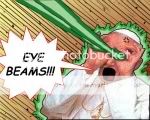'Under God' Lawsuit Cropped
Judge Narrows Pledge of Allegiance Lawsuit
from The Associated Press
SACRAMENTO, Calif. - An atheist who convinced a federal appeals court three years ago that the words "under God" in the Pledge of Allegiance are unconstitutional returned to court Monday and made his case a second time.
three years ago that the words "under God" in the Pledge of Allegiance are unconstitutional returned to court Monday and made his case a second time.
Michael Newdow, a doctor and lawyer, is suing four Sacramento-area school districts on behalf several atheist children and their families. The U.S. Supreme Court dismissed his first case last year, saying he lacked standing to bring it on behalf of his elementary-aged daughter because he did not have custody of her.
Newdow suffered a setback Monday in his latest case when the judge said he plans to throw out several parts of Newdow's lawsuit.
U.S. District Judge Lawrence Karlton indicated that he planned to block Newdow from having the pledge itself and the words "under God" declared unconstitutional. His lawsuit instead would focus strictly on whether reciting the pledge in public schools is an unconstitutional endorsement of religion, meaning Newdow could still have the pledge barred from schools if he prevails in the long-shot effort.
"What I'm doing is cutting out a whole lot of your case and making it narrow," Karlton said during the first hearing on the lawsuit.
Terence Cassidy, a lawyer for the Elk Grove Unified School District, urged the judge to dismiss the entire case. He said reciting the pledge in school was not about religion, but rather is designed "to teach children about patriotism."
Despite his indication about limiting the lawsuit, the judge acknowledged that Newdow may have a valid point about the pledge in schools. The words "under God" were inserted into the pledge by Congress in 1954.
"There is nothing whatsoever that requires acknowledging God to love this country," Karlton said.
After Monday's hearing, Newdow appeared unmoved by the judge's expected narrowing of the lawsuit. He said any decision was likely to be appealed.
Newdow won his initial case before a San Francisco federal appeals court. That court said it was an unconstitutional blending of church and state for public school students to pledge to God. In June 2004, the Supreme Court rejected the case.
Eight co-plaintiffs have joined the latest lawsuit. The plaintiffs' names have been withheld for fear of physical harm.
"We're a despised minority," Newdow told the judge.
from The Associated Press
SACRAMENTO, Calif. - An atheist who convinced a federal appeals court
 three years ago that the words "under God" in the Pledge of Allegiance are unconstitutional returned to court Monday and made his case a second time.
three years ago that the words "under God" in the Pledge of Allegiance are unconstitutional returned to court Monday and made his case a second time.Michael Newdow, a doctor and lawyer, is suing four Sacramento-area school districts on behalf several atheist children and their families. The U.S. Supreme Court dismissed his first case last year, saying he lacked standing to bring it on behalf of his elementary-aged daughter because he did not have custody of her.
Newdow suffered a setback Monday in his latest case when the judge said he plans to throw out several parts of Newdow's lawsuit.
U.S. District Judge Lawrence Karlton indicated that he planned to block Newdow from having the pledge itself and the words "under God" declared unconstitutional. His lawsuit instead would focus strictly on whether reciting the pledge in public schools is an unconstitutional endorsement of religion, meaning Newdow could still have the pledge barred from schools if he prevails in the long-shot effort.
"What I'm doing is cutting out a whole lot of your case and making it narrow," Karlton said during the first hearing on the lawsuit.
Terence Cassidy, a lawyer for the Elk Grove Unified School District, urged the judge to dismiss the entire case. He said reciting the pledge in school was not about religion, but rather is designed "to teach children about patriotism."
Despite his indication about limiting the lawsuit, the judge acknowledged that Newdow may have a valid point about the pledge in schools. The words "under God" were inserted into the pledge by Congress in 1954.
"There is nothing whatsoever that requires acknowledging God to love this country," Karlton said.
After Monday's hearing, Newdow appeared unmoved by the judge's expected narrowing of the lawsuit. He said any decision was likely to be appealed.
Newdow won his initial case before a San Francisco federal appeals court. That court said it was an unconstitutional blending of church and state for public school students to pledge to God. In June 2004, the Supreme Court rejected the case.
Eight co-plaintiffs have joined the latest lawsuit. The plaintiffs' names have been withheld for fear of physical harm.
"We're a despised minority," Newdow told the judge.




























0 Comments:
Post a Comment
<< Home